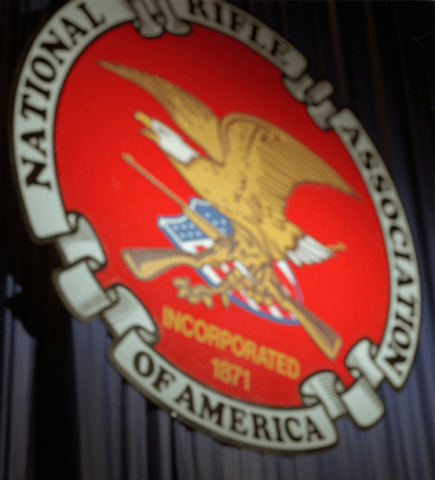
One might think from the oceans of venom and ink hurled at the National Rifle Association by President Clinton, Sarah Brady, and the anti-gun fanatics of the Establishment press that the NRA is the unwavering, unshakable, and indefatigable champion of the natural right of all Americans to keep and bear arms. Is not the simple fact that NRA leaders Charlton Heston and Wayne LaPierre are daily pilloried and burned in effigy by the disarmament zealots proof positive that they are the premier defenders of the Second Amendment?
Yes, the NRA is the arch-villain whom gun-banning extremists love to hate. It is the largest, oldest, wealthiest, most powerful gun-rights organization on the planet. But is the venerable gun group worthy of the odium heaped upon it by its enemies? We wish it were. However, as we shall show, it is getting more and more difficult to look at the record and rhetoric of the NRA without seeing a chronicle of piecemeal, strategic surrender. For all its bluster about standing four-square and forever firm against all infringements on the right of private citizens to own firearms, the NRA appears to have already resigned itself to gradual defeat on its most basic issues. Now, it seems, the organization is completely preoccupied with convincing its loyal and generous members that its concessions (some might say betrayals is more accurate) on vital gun rights are victories, not defeats.
Strange Bedfellows
Who would have thought, for instance, that they would live to see the day when the NRA would be lining up shoulder to shoulder with its nemesis, Handgun Control, Inc., to applaud the biggest-ever expansion of the federal Bureau of Alcohol, Tobacco and Firearms (ATF)? Yet that is what we saw earlier this year, when President Clinton proposed to double the ranks of ATF inspectors and increase the number of ATF gun agents by 23 percent. What’s more, the Clinton package called for a vast new army of federal, state, and local prosecutors to “fight gun crimes.”
The Chicago Tribune, in a January 18th story entitled “Clinton plans gun-law enforcement push,” described the plan thusly: “President Clinton plans to announce today an initiative that the White House is calling the biggest gun enforcement push in history, a $280 million plan to hire 500 new firearms-law enforcers and 1,100 gun-crime prosecutors.” The story went on to report that “representatives of Handgun Control Inc. and the National Rifle Association both applauded the idea.”
The Tribune story continued:
“We’ve often said that strong enforcement is needed, and one key is boosting ATF,” said Handgun Control President Robert Walker. Meanwhile, NRA Executive Vice President Wayne LaPierre said he backs the plan, but he was skeptical the administration would follow through.
“I don’t want to declare victory on this without letting it be known that we will hold them to it and monitor their performance and report to the American people,” LaPierre said. “It better be more than just a sound bite, but we’re for it in a big, big, way,” he said.
Yes, this is the same ATF whose agents the NRA once described as “jack-booted government thugs.” Has some miraculous transformation that we do not know about come over the Clinton thugocracy to render it less hostile to private gun ownership and more solicitous of the Second Amendment? Have the ATF’s minions turned in their jack-boots and SWAT regalia for ballet slippers and tutus? Have Bill Clinton or Janet Reno said or done anything in recent memory to support any illusion of hope that, with these hundreds of new agents and prosecutors, the ATF and Department of Justice might go after real criminals rather than using these new resources to entrap, persecute, and prosecute gun owners, as they have done in the past?
The NRA leadership apparently thinks so, but they can cite very little evidence to support such false hopes. Oh, they are very high now on their new pet project: Project Exile. In full-page newspaper ads last year, the NRA urged Congress to “Adopt and fund Project Exile nationally … every violent felon caught with a gun goes to jail for 5 years, period.” Under the Exile program, state and local prosecutors assist and defer to federal prosecutors, who have a more “streamlined” process and tougher sentencing. And, undoubtedly, they can point to some genuine victories in taking violent felons off the street, but at a cost of doing extreme violence to our country’s constitutional separation of powers.
Chief Justice of the U.S. Supreme Court William Rehnquist has emphatically warned of the dangers from the recent vast expansions of “federal jurisdiction over crimes involving drugs and firearms,” as well as taken notice of the perilous trend to “federalize” certain juvenile crimes. “Unless steps are taken to stop or reverse this trend,” said Justice Rehnquist in his 1998 State of the Judiciary report, “either the demands placed on the federal judiciary will eventually outstrip its resources, or the judiciary will become so large that it will lose its traditional character as a distinctive judicial form of limited jurisdiction.”
Justice Rehnquist went on to wisely note:
The pressure in Congress to appear responsive to every highly publicized societal ill or sensational crime needs to be balanced with an inquiry into whether states are doing an adequate job in these particular areas and, ultimately, whether we want most of our legal relationships decided at the national rather than local level. Federal courts were not created to adjudicate local crimes, no matter how sensational or heinous the crimes may be. State courts do, can, and should handle such problems.
These concerns have been echoed recently by the National Sheriffs Association, the National District Attorneys Association, and the American Bar Association, all of which have decried the continued encroachment of the federal government on state and local jurisdictions. People who treasure the freedom that flows from assiduously maintaining our constitutional checks and balances and separation of powers will not see a solution to our problems of crime and violence in calling on Washington to — as the NRA says — “just enforce the laws already on the books.” Many of those federal laws are already unconstitutional and should be repealed, not enforced.
Even if the Clinton/Reno Justice Department could be held to going after only violent criminals (surely a vain hope), expanding federal police and prosecuting resources and authority will come back to ensnare us in many ways. Nevertheless, in his May 27, 1999 testimony before the House Judiciary Committee’s Subcommittee on Crime, NRA Executive Director Wayne R. LaPierre reiterated the group’s endorsement of this federalizing trend. While rightly and forcefully condemning the draconian, full-speed-ahead gun control proposals tendered by the notoriously anti-gun Senator Frank Lautenberg (D-NJ), LaPierre offered as an alternative a reduced-speed package headed in the same direction. Said the NRA exec:
• “We think it’s reasonable to provide mandatory instant criminal background checks for every sale at every gun show. No loopholes anywhere for anyone.”
• “We think it’s reasonable to prevent all juveniles convicted of violent felonies from owning guns, for life.”
• “We think it’s reasonable to provide full funding for the National Instant Check System so it operates efficiently and instantly.”
• “We think it’s reasonable to support the federal Gun-Free School Zones Act.”
• “We think it’s reasonable to expect full enforcement of federal firearms laws by the federal government.”
Each of the NRA’s “reasonable” endorsements constitutes support for federal usurpation of power and an expansion of the federal police state. Let’s just look at its endorsement of “full enforcement of federal firearms laws by the federal government.” That stance puts the NRA in the position of accepting the false claims of the gun control lobby that Congress may constitutionally infringe on gun rights. It also lends credence to the notion that the anti-gun laws Congress already has passed, if fully enforced, could curb firearm-related criminal activity without eviscerating the Second Amendment. Ergo, if enforcement of existing federal legislation helps reduce crime, why not enact more to further reduce, or eliminate, crime?
Consistently Inconsistent
The NRA assures its members in no uncertain terms that it is dead-set against firearms registration, rightly pointing out that, in country after country, registration lists have been used by governments to seize the means of defense against tyranny. In fact, it says gun registration is “inherently evil.” In a position statement entitled “Licensing and Registration,” posted on its website on April 9th, the NRA’s Institute for Legislative Action states that, for gun owners, “perhaps only one other word in the English language so boils their blood as the word ‘registration,’ and that word is ‘confiscation.’ Gun owners fiercely believe those words are ominously related.”
Indeed they are. Which is what makes the NRA’s insistent support for the National Instant Check System (NICS) so incredible and so dangerous. The “instant check” system provides the basis and the means for a national, computerized firearms registration database.
The 1993 Brady law authorized a temporary five-day waiting period, applicable only to handgun purchases, for five years, to be superseded after November 30, 1998 by an “instant check” system that would cover rifles and shotguns as well. The chief proponent of the “instant check” compromise was the NRA, which has resolutely defended it ever since. During the heat of battle over the Brady bill, NRA lobbyists, rather than standing firm in opposition to the measure, became more concerned about modifications that would “improve” it and make it acceptable. USA Today for October 26, 1993 quoted NRA spokesman James Baker as saying, “We already support 65 percent of the Brady bill, because it moves to an instant check, which is what we want.”
Now, in its “Licensing and Registration” statement, the NRA tells its members: “Enactment of the Brady Act, for example, establishes the principle of a national gun licensing system. Once a lenient national handgun licensing system is established, the licensing system can gradually be tightened, and police, as they have done in Great Britain, can begin inventing their own conditions to put on licenses.” Why didn’t NRA leaders recognize this danger before, when it was supporting the instant-background-check provision in Brady, against the protests of many of its most experienced members, as well as against the advice of many other gun groups?
And why does the NRA leadership continue to support the NICS when their own research and experience shows it to be faulty, costly, and abusive? On March 9th, the NRA posted on its website a harsh critique entitled, “GAO Finds Fault With FBI’s NICS Operation,” which points out that “the FBI’s ‘Instant Check’ often isn’t ‘instant’ for honest citizens.” The federal Government Accounting Office report, notes the NRA, “shows that the system failed to provide ‘instant’ checks 28% of the time, adversely affecting the rights of nearly 1.2 million law-abiding citizens. Nearly one-quarter of the citizens who appealed had their denials reversed. Those wrongful denials, GAO reports, were caused by FBI examiner error in 42% of the cases.”
A more serious problem with the NICS is to be found in the NRA’s own pending lawsuit against the Justice Department, for making the NICS into precisely what its opponents warned it would become: a national registration system. Under directives from Attorney General Reno, the FBI has been maintaining the records of people who have applied to purchase firearms. The NICS was sold as a system that would provide an “instant check” to assure that the applicant did not have a criminal record. But, we were assured, there would be no permanent record made of applications, which would constitute a form of registration. Guess what? The Reno DOJ/FBI illegally insists on making those “instant” checks into permanent records. That should come as no surprise. What doesn’t compute is the NRA leadership’s continued support for this proven threat to rights it claims to cherish and defend.
Photo: AP Images



